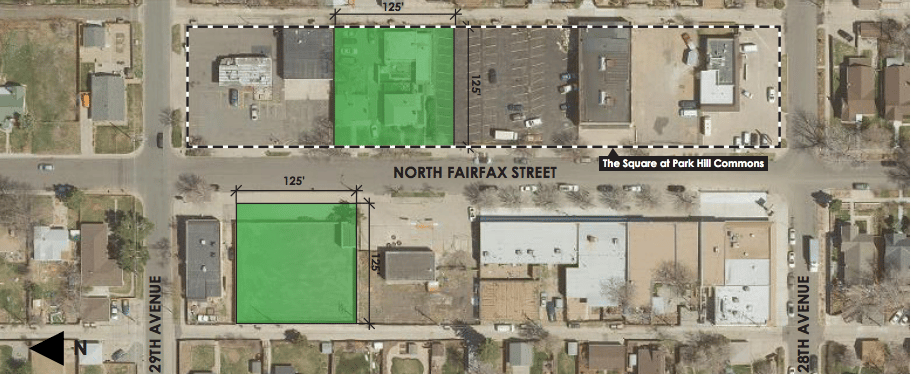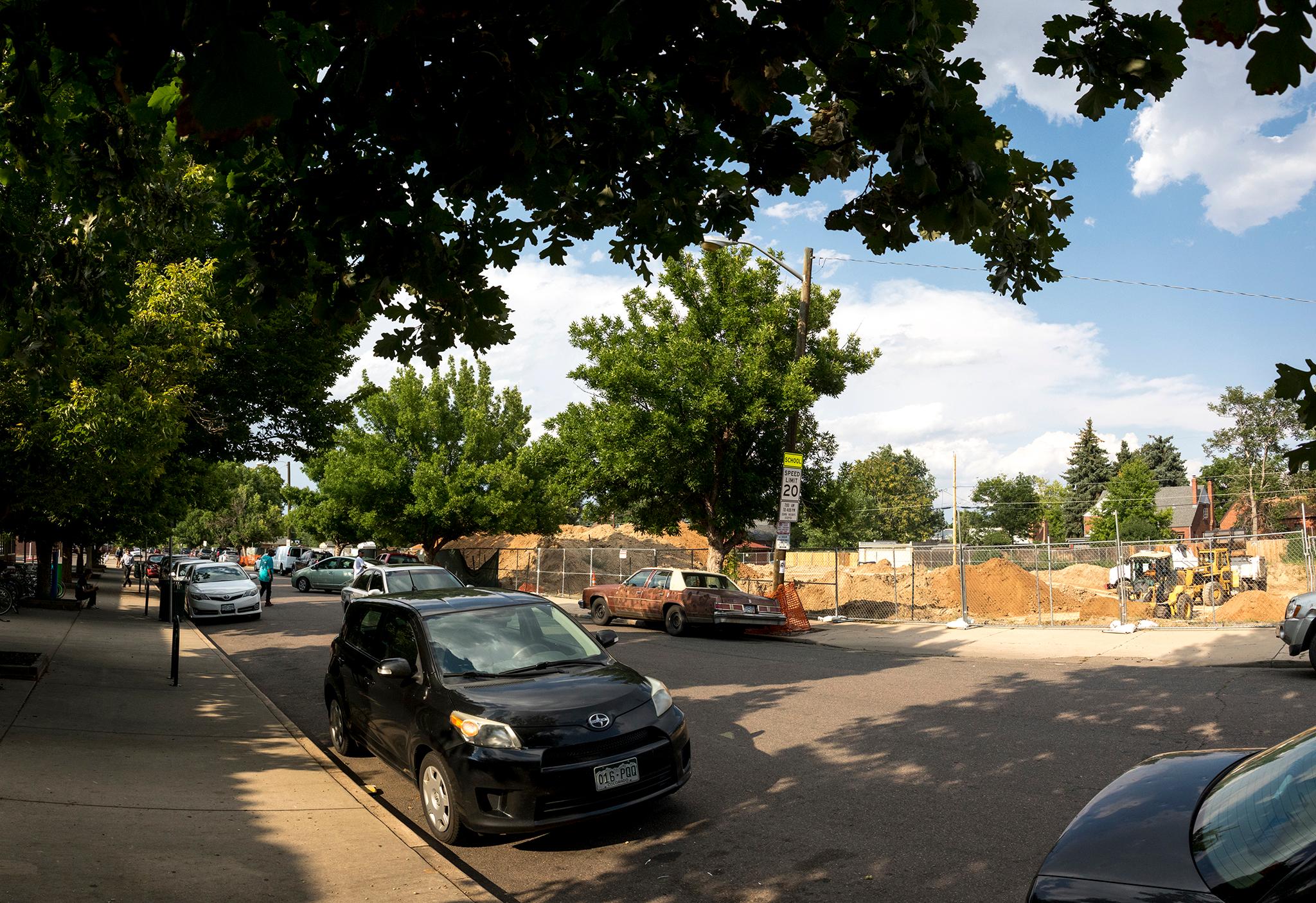The public hearing before the Denver City Council on Monday lingered on a single action with two outcomes: Should the council approve a land swap in North Park Hill and get a park out of it in the process?
The responses on Monday gave council members suggestions for how they should answer. But more broadly, they offered a glimpse of conversations no doubt happening in other neighborhoods in Denver, as the more than 25 residents who spoke offered comments about transparency, gentrification and public safety.
The bill would approve a contract between the city and developers to trade two small square plots of land, turning one into a multi-use development and one into a public park that the developer would help fund.
Members of the public who spoke were nearly evenly split between those for and those against the bill introduced Monday, but 12 of 13 City Council members voted in favor of the bill at the conclusion of the public hearing, with Councilman Paul Kashmann abstaining. (He said he wasn't a "yes" yet.) The vote is considered a first-read vote and a second vote is expected next week.
Those opposed voiced concerns over what they felt was a lack of transparency during the project’s development, its potential to exclude or even increase the potential for harassment toward residents of color and to continue diminishing the area's place as a historically black neighborhood.
Those in support were happy to have a park brought to the area. Many supporters said the plan provided funding that simply wasn't otherwise available, while a few expressed disappointment that a discussion over a park had turned into a referendum on racially-based concerns.
The two plots sit across from one another on Fairfax Street. One is a city-owned property purchased in 2015 from Xcel Energy for $50,000. The city wanted to develop the plot into a pocket park.

Under the proposal, the two plots would be swapped: The square lot near the corner of 29th Avenue and Fairfax Street, owned by the city, would be switched with an equally-sized plot across the street owned by HM Capitol. Both blocks are .36 acres in size. The plot HM Capitol would keep would be turned into a roughly 60,000-square foot mixed-use development including micro-units and office space.
As part of the swap, HM Capitol would “donate” $650,000 to complete the park. The money includes $100,000 for design and $550,000 for construction use.
Councilman Albus Brooks asked Denver Parks and Recreation Deputy Manager Scott Gilmore why there wasn’t more consideration for the potential community concerns and requested more inclusion.
Gilmore, who is married to Councilwoman Stacie Gilmore, said he acknowledged things moved quickly and there were some missteps, but he said that he was trying to build a park for everyone. He added that there were several community meetings including three meetings on the project hosted by the Greater Park Hill Community to include their input.
“We were just trying to move forward,” Gilmore said. “We saw a great opportunity get a park built in a community that desperately needed it with somebody else's money.”
The concerns dealt with transparency and gentrification, while support for the project dealt with the improvement of bringing a park to the neighborhood.
Robyn Fishman was the first resident to speak. She said she lives four houses down from the development and while the neighborhood could have been provided more input, she said if neighbors work with developers, the park will be one “that’s open to all.”
Benjamin Sharp said he supported the deal since it helps provide funding for a park that didn’t have any. Christina Cryer agreed, adding that this helps save taxpayer dollars.
“It is a win for the neighborhood. We get a park soon rather than later,” Cryer said.
Alison Larson had a different view. A Park Hill resident, she said she wasn’t opposed to the park but to the process behind it. This was a common theme among those who opposed it. Larson said there wasn’t enough transparency about in the process, which has consequences she said the city needs to pay close attention to. She said the project was not "equitable" or "thoughtful" toward the people who currently live there.
“These type of things happening continue to make that divide even greater,” Larson said. “It still has some diversity. It still has some rich culture.”
Miguel Adrian Ceballos-Ruiz, a city council candidate running for the District 8 seat, said the he understood the bill was about the park, but also what would end up being built across from it.
"Initially, the developer wanted to make this a private park," Ceballos-Ruiz said. "That is regrettable, but more than that it is telling—telling of who will be welcomed at this park."

Tiffany Kampsnider said she felt sad over what the conversation had become: A racial issue that’s pitted neighbor against neighbor. She supported the bill, but didn’t think the park would provide any kind of healing for issues of gentrification.
“We need to move forward with a park that has funding in place, that has timing in place to serve the community better,” Kampsnider said.
Sandrea Robnett’s fear is that the development will only perpetuate harassment of people of color. Robnett, who identified herself as African-American and Latina, said the park will create another opportunity for people of color to be put at risk by residents who call the cops on them for hanging out.
“We shouldn’t have to worry because the police will be called on when we have a barbecue,” Robnett said.
HM Capital President Ben Maxwell — a former Park Hill resident — said he felt a mixed-use development was the best possible use for that lot.
The development doesn’t include any spaces for affordable housing, which was another objection some folks had for the swap. Maxwell said technical affordability on this project “didn’t work out.”
Before he was pressed by council members, Maxwell spoke during the public hearing. He said he felt regret that the project had turned into “a fight over gentrification.”
“Our biggest goal with this project is to unite the community, so it’s very sad that that’s gone in the opposite direction,” Maxwell said. He said he wants to “repair those relationships.”
Council members, like the residents, seemed to have mixed feelings about the proposal.
"Tonight I'm just sad," said Brooks, who used to represent the area and said he would support the proposal, said near the meeting's closing. "I know who are friends here and I see you on opposed sides. And that's not the vision of our neighborhoods."
Calling the proposed project deal as a failing "of the administration," Councilman Rafael Espinoza said negotiators on the city's side didn't push hard enough. He said he will be supporting it, but he called it a "tough deal" that worked out in favor of the developer, whom Espinoza said he couldn't blame for the deal. Councilman Paul Kashmann said he agreed with Espinoza's views.
"This is not the deal that I would have negotiated," Espinoza said. "This project will expedite gentrification — with or without the park."
Councilman Paul D. López said he understands concerns from black and brown residents who have had cops called on them for simply having a barbecue at a park.
"Nobody gave me a race card ... it's happening, and we have to address it," López added.
Councilwoman-at-large Robin Kniech said she feels the developers will need to rebuild trust with the community, considering Maxwell acknowledged there were things that were initially suggested by the developer, like designing and naming the park themselves, that have since changed. Maxwell said he's committed to continuing conversations with community members, while Gilmore added that the park will be owned by the city and the community will be involved in its naming.
Councilwoman Deborah Ortega said she was initially on the fence about the proposal, but said she plans on supporting it. Councilman Chris Herndon said that the project is prompting conversations that should be had in the community.
"Let's continue to move forward. Let's continue to have these conversations," Herndon said.
What’s next?
The bill will come back to council for a second read and final vote during their meeting next week.













